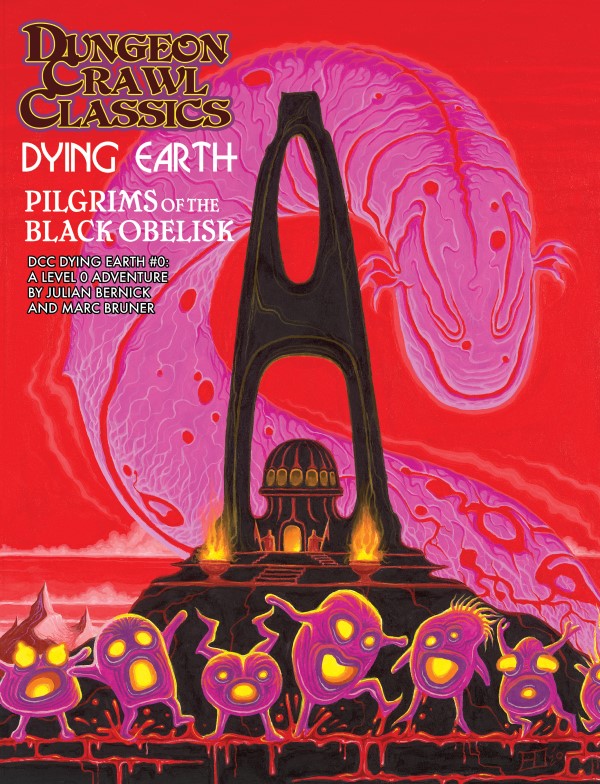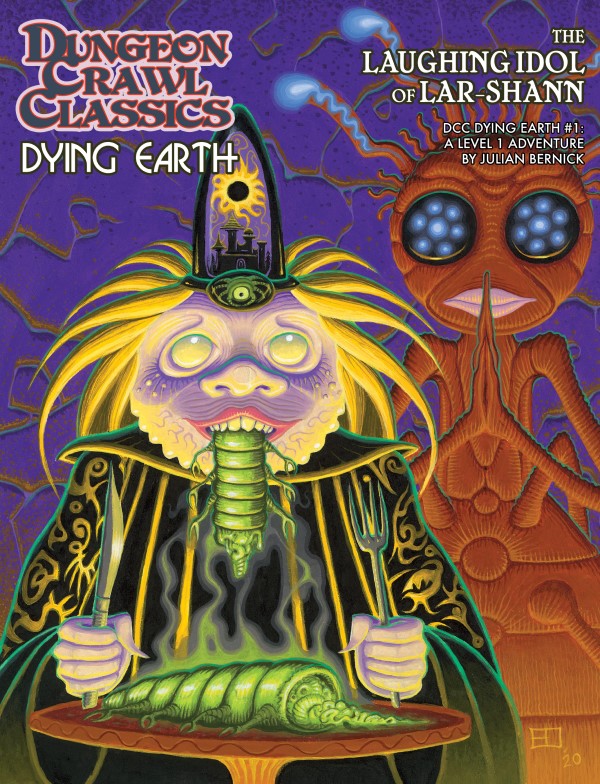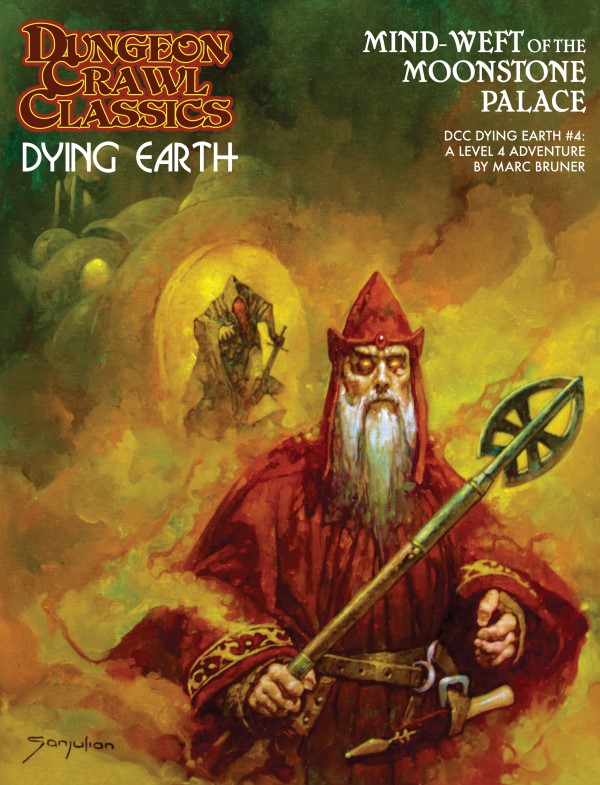
Welcome to the wondrous far-future world of DCC Dying Earth! The DCC Dying Earth Setting is an all-new gaming universe for Dungeon Crawl Classics, inspired by the classic sword-and-sorcery works of Jack Vance. To celebrate the release of DCC Dying Earth, we are showcasing a series of articles that looks at the many unique classes, spells, equipment, mechanics, and themes that go into making DCC Dying Earth a completely new experience!
The DCC Dying Earth Magician is AWESOME! Why Would I Bother Playing a DCC Wizard?
By Terry Olson
Mazirian stroked his chin… he would seek through his books for spells to guard him through the unpredictable glades. They would be poignant corrosive spells, of such a nature that one would daunt the brain of an ordinary man and two render him mad. Mazirian, by dint of stringent exercise, could encompass four of the most formidable, or six of the lesser spells.

This passage occurs early in the first chapter of Jack Vance’s first Dying Earth book, Mazirian the Magician (previously titled The Dying Earth). This concept of temporarily storing spells in one’s brain is a keystone in “Vancian Magic” and well known to who have played early editions of D&D. In these adaptations, a PC memorizes a spell and later casts it, losing it until repeating the memorization. The outcome of the spell is predicable, except perhaps for a random element to its damage or duration.
In creating DCC Dying Earth‘s primary arcane caster class, the magician, we were challenged: How do we simultaneously stay true to the fiction while making the class mechanics feel novel and DCC-ish?
Staying true to the fiction meant that we had to have memorize/cast/forget. But, this had to feel like DCC rather than something that had already been done. We accomplished this with three fundamental mechanics: rote magic, amplification, and force of will.
Rote Magic
Here’s a DCC Dying Earth excerpt regarding rote magic.
“Whereas the arch-magicians of the past glimpsed the underlying patterns of magic and created new spells to vibrate and twist the fabric of space, magicians in the Twenty-first Aeon are more craftsmen than innovators, building on the work of those who came before. Consequently, a magician learns magic by rote, relying on the magical pathways that have been forged by past magicians and passed down through the aeons. He typically learns a single way to cast a spell, reflecting how spell formulas are passed between or acquired from other practitioners, but does so with a high degree of accuracy… Upon learning a new spell, a magician makes a spell check to determine the specific spell result he has mastered for a given enchantment. A magician’s rote magic spell check starts at 1d16 + Intelligence modifier + caster level, and improves over time as his understanding of the underlying mosaic of magic increases. At a minimum, he can cast a spell at its lowest spell check result.”
When a magician learns a spell, she makes a rote magic check that determines the “base result” for the spell whenever it is memorized and cast. At level 1 this check is made with a d16. This might seem less than inspirational, but each time the magician levels she can make this check again and keep the best result… Oh, and that d16 keeps increasing until it is a d30 at level 6. Yes, this means that a magician who luckily crits the rote magic check at 6th level gets an unmodified 30 on their spell check every time she casts the spell! (Advanced detail: a magician that memorizes too many spells with rote magic checks of 20 or more must burn Personality or lose their sanity. Beware!)
“Fine,” you say, “but what about my level 1 magician who’s stuck with a base spell check of 12 for magic missile that she can only cast at most three times per day? I might as well play a DCC wizard!” We had the same sentiments. Bear with me, dear Reader. We’ll empower your slinger of 1-point bolts of doom.
Amplification

Because you’re a discerning (and invested!) reader, you realized I said “base result” for the rote magic check above. A magician can alter their spell check at the time of casting, albeit unpredictably, with the amplification roll. Here is an excerpt from the text.
“By using his understanding of the patterns of magic, a magician can attempt to manipulate the torsions of underlying phlogiston to amplify his casting from its fixed spell check. In doing so, he risks losing control of the spell and its effects, transfiguring the casting into a weakened version of the spell—or even rendering the spell solvent of magical effects. The master mathematician, Yrret, codified the effect as follows: the amplification roll requires two dice of the same number of faces, preferably of different colors: the up die, and the down die.”
If the up die comes up equal to or larger than the down die, the up die’s result is added to the check. However, if the down die comes up larger, then the down die’s result is subtracted from the check. There are two special cases to note. If both dice show the maximum, then both are added to the check. Frighteningly, if both dice show 1s, then the spell is lost for the day, and the caster must roll on the spell’s failure table as if a natural 1 was rolled on a spell check.
As the magician levels up, the amplification die increases. At level 1 it’s a d3, at level 6 it’s a d8, and at level 10 it’s a d16! So, if both the up and down die come up as 3s, your aforementioned level 1 slinger of 1-point bolts of doom turns the 12 spell check into an 18 (1d4 missiles for 1d4+CL damage) . And should your doom slinger survive to level 10, they could possibly change that 12 to 44! But, you would have re-rolled that rote magic check by then with a d30, right? Right!
“Yeah, that’s kind of cool,” you say, “but I could also lose one of my preciously few spells; a limited number of spells per day is a drag. I might as well play a DCC wizard!” I’m noticing a theme, dear Reader, but fear not. I’ve saved the best for last.
Force of Will
We wanted to give the DCC Dying Earth magician an arcane offensive capability nonpareil among the DCC classes. In the early stages, we too wondered whether we’d rather play a DCC wizard. What could we do that gave magical power not relying on a spell, but still had limits? Jack Vance provided the solution in the Morreion chapter of Rhialto the Marvellous.
Morreion made a furious motion; as his hand swept the air, it left a trail of sparks. “Magic derives from personal force! My passion alone will defeat the archveults! I glory in the forthcoming confrontation. Ah, but they will regret their deeds!”
Here is the resulting adaptation for force of will: “At need, a magician can direct magic by channeling his raw passion, unleashing nearly illimitable will and power against any imprecation, perceived or real. He can use this ability to attack opponents, shatter objects, or even as a means of defense against magical assaults and ensorcelments.”
Now. We. Are. Talking!
Personally, this is my favorite class feature for the magician. Burn at least point of Personality and make a spell check modified by expended Personality (which heals back, similar to spellburn). You can damage foes with impossible armor classes. You can shatter barriers that dare to block your progress. You can use it to counter any spell from a mooncalf with the audacity to engage you in a spell duel. There’s a lot of freedom for the judge to interpret the result both situationally and cinematically. It’s kind of like a warrior’s deed without the deed die. Arcanely awesome.
Here are a few sample entries.

12-13: A flicker of emotion spurts forth in a blast of crackling power, causing 1d3+CL damage to the target. Non-magical objects up to the size of an apple that are not immediately destroyed by the blast automatically shatter unless they make a DC 8 Fort save. The object’s save is based on the type of material: glass has a +0 save, wood or clay have +1, stone has +2, and iron or steel have +3. Unique or specialized materials may have other properties and benefits at the judge’s discretion. (Range 30’)
20-23: The magician’s rage breaks against the target with a scintillate fury, causing 2d10+CL damage. Non-magical objects the size of a small chest or boulder automatically shatter as above unless they make a DC 14 Fort save. (Range 60’)
32+: The charge of the entire magician’s personal force blasts out in a surge of power, causing 8d12+CL damage to the target. Large non-magical objects such as castle walls, spires, and buildings automatically shatter as above unless they make a DC 24 Fort save. Magic items can also be broken if the force of will check exceeds the spell check used to create the item, and a minimum permanent Personality expenditure of 1 point per magical modifier point of the item to be shattered is required. If successful, the magic item fractures with a crack that echoes throughout the sub-worlds, inflicting 1d12 points of magical damage per point of the item’s modifier to everything within 30’. (Range 240’)
Force of will has completely turned encounters around due to both its versatility and potency. I’ve also noticed in playtests that folks don’t use it enough. Don’t let that be you! Burn that Personality to the ground! Who cares if you’re almost a babbling idiot barely able to feed yourself? Explode the brain of the fop who dares to point it out! (Psst: IOUN stones allow you to store Personality points for later use… just sayin’.)
In addition to the arcane awesome of rote magic, amplification, and force of will, there are even more reasons to play a magician: named magic through spell personalization, eternal youth through reincarnation, a learned pandectist, a sandestin summoner, etc. I hope that by now, dear Reader, you and I are in complete agreement. The DCC Dying Earth magician is AWESOME! Why would I bother playing a DCC wizard?

Stay connected with us on social media platform for instant update click here to join our Twitter, & Facebook
We are now on Telegram. Click here to join our channel (@TechiUpdate) and stay updated with the latest Technology headlines.
For all the latest Gaming News Click Here
